Adlai Stevenson, former governor of Illinois who twice challenged Dwight Eisenhower for the presidency, termed the period prior to an election the “liberal hour.” It was a partisan jab aimed at rival Republicans who seemed to abandon their conservative principles on an election’s eve and embrace popular progressive economic programs to appease working class voters. It is no coincidence that bipartisan support for Social Security, for example, appears to peak on even years.
A similar anomaly with predictable policy prescriptions can be seen in American foreign policy. Our Constitution, after ratification of the Twenty-second Amendment, enables an “internationalist moment” in a president’s eighth year. Facing forced retirement and often a divided government, a president nearing the end of his second term instinctively seeks to secure his legacy. He reasserts himself on the world stage, where he invariably enjoys senior statesman status and usually encounters less domestic political interference. A lame duck at home, an American president in his eighth year spreads his wings abroad.
I witnessed this tendency first-hand while serving on the staff of the National Security Council from 1998 to 2000. President Clinton, engulfed at the time in impeachment controversies at home, embarked on a series of ambitious initiatives abroad, from marshalling NATO and Russian support for war against Serbia, to normalizing trade relations with China, to seeking a comprehensive peace between Israelis and Palestinians. Since 1951 when presidents’ tenures became limited, five have found themselves in the same moment.
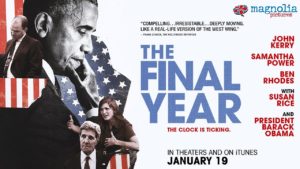 HBO’s recently released documentary The Final Year captures President Obama’s similar internationalist moment, shadowing him and his foreign policy team throughout 2016. It is a behind-the-scenes look at the inner-workings of senior staff urgently seeking to secure their principal’s legacy in world affairs. The documentary’s dramatis personae feature the president; his secretary of state, John Kerry; his national security advisor, Susan Rice; his ambassador to the United Nations, Samantha Power; and his deputy national security advisor for strategic communications, Ben Rhodes. The theatrical tension revolves around the latter two. Power and Rhodes were both starters in Obama’s foreign policy “pick-up team,” hitching their fortunes to the junior senator from Illinois in the early days of his first presidential campaign. But despite parallel trajectories, they represent divergent perspectives of the president’s worldview.
HBO’s recently released documentary The Final Year captures President Obama’s similar internationalist moment, shadowing him and his foreign policy team throughout 2016. It is a behind-the-scenes look at the inner-workings of senior staff urgently seeking to secure their principal’s legacy in world affairs. The documentary’s dramatis personae feature the president; his secretary of state, John Kerry; his national security advisor, Susan Rice; his ambassador to the United Nations, Samantha Power; and his deputy national security advisor for strategic communications, Ben Rhodes. The theatrical tension revolves around the latter two. Power and Rhodes were both starters in Obama’s foreign policy “pick-up team,” hitching their fortunes to the junior senator from Illinois in the early days of his first presidential campaign. But despite parallel trajectories, they represent divergent perspectives of the president’s worldview.
Power, a Harvard professor who parlayed her experience as a wartime journalist covering the Balkans to write a history of genocide, advocates forceful action, military or otherwise, to remedy many of the world’s woes. She criticizes realism for its relative indifference to humanitarian concerns, and rejects as false the choice between values and interests. In contrast, Rhodes, an aspiring novelist and foreign policy wunderkind known for capturing his master’s voice in soaring prose, stresses the limits of American hard power and the potential of soft power. Power plays the hawk and Rhodes the dove in the gilded cage that was President Obama’s final year.
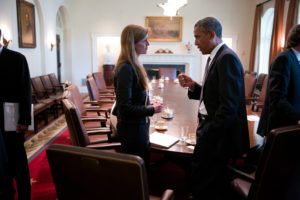
The documentary traverses the globe, from Africa to the Arctic, Havana to Hanoi, but it is in Syria where the cockfight personified by Power and Rhodes climaxes. Indeed, the president claims that “on no other issue was there such a split” between them. Four years after Obama infamously drew but failed to enforce a “red line” on Syrian dictator Bashir al-Assad’s use of chemical weapons, the administration was reaping what it had sowed. The civil war raged on, spewing millions of refugees and spawning an Islamist caliphate. Syria had become a “complete meltdown in humanity,” according to Power, and President Obama again faced acute pressure to act—militarily or diplomatically—to end the carnage.
In documenting this momentous policy debate, director Greg Barker reaches the limits of his access and is able only to record the contestants’ reactions after the president again favors diplomacy in Syria. Rhodes’ view prevails, and Power’s pained retelling thinly veils her deep disappointment. She describes the administration’s inaction in Syria as “haunting,” and laments that “there’s no issue where my thoughts and my feelings and ideas have made such a marginal impact on desperate people.”
President Obama’s dovish stance in Syria suggests that, in the narrative arc of his foreign policy, Rhodes is the vector. The formulation of the president’s final UN General Assembly address further confirms their reported “mind meld.” Over Power’s objection, Rhodes drafts the speech in guardedly uplifting terms, describing a world “less violent and more prosperous than ever before.” He concedes that she argued it was “discordant with the prevailing mood.” Indeed, Power would admit that, “I’m not in the same place with the president anymore, and our worldviews are really different now” (a quote she later explained was merely a comment on her place at the United Nations versus the White House). The diplomatic apologetic that is the president’s “farewell address” conforms to Rhodes’ greater ambition—to affect a kind of reversal of Clausewitz in which American foreign policy is war by other means. As he asserts at the documentary’s outset, “In the time remaining, we are trying to convey that this is a different way of doing foreign policy, less militarized, more engagement-focused.”
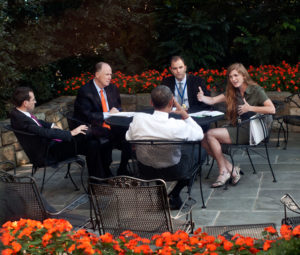
Ultimately, a sixth unseen actor plays the starring role: Fate. Throughout its final year, the Obama administration’s foreign policy is bedeviled by the inadvertent and unexpected. The death of a young boy accidentally struck by Power’s convoy during her April trip to Cameroon serves as an omen. In September, American warplanes mistake Syrian civilians for terrorists, providing Russia a false pretext for destroying a humanitarian mission and shattering the ceasefire Secretary Kerry had painstakingly brokered. And in November there is the most fateful surprise of all for President Obama’s foreign policy legacy: the upset election of Donald Trump to succeed him. It recalls the adage that to make God laugh, tell Him your plans.
This, then, is The Final Year’s unintended moral, one befitting this Lenten season: from dust thou art, and to dust shalt thou return. The presidential quest for a foreign policy legacy, abetted by constitutional time constraints of his office, is essentially an expression of hubris, blurring national interest and moral duty with concerns for personal reputation. President Obama, an anti-war candidate who ironically became the only commander-in-chief in our nation’s history to be at war throughout his two terms, seemed allergic to being personally associated with launching yet another. Hubris of this well-intentioned sort has its moral utility: insulated from reelection politics, President Obama was able to help heal historic wounds in valedictory visits to Vietnam, Laos, and Hiroshima. But it also has its perils, as the continual catastrophe in Syria attests.
As The Final Year shows, President Obama’s “internationalist moment” proved to be a tragic one, ending in misfortune not only abroad but at home. And it painfully proved the paradox that whoever finds their legacy will lose it.
—
Matt Gobush served at the National Security Council in the Clinton White House, and as chair of the Episcopal Church’s Standing Commission on International Peace and Justice. He currently works in the private sector and lives in Dallas, Texas.
Feature Photo Credit: President Barack Obama meets with Chief of Staff Denis McDonough and Ben Rhodes, Deputy National Security Advisor for Strategic Communications, right, in the Oval Office on August 7, 2014. Official White House Photo by Pete Souza.


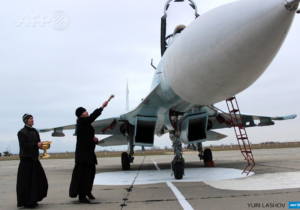

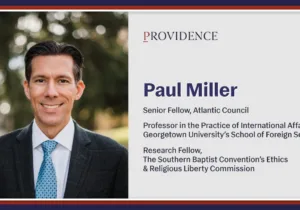


 Sponsor a student for Christianity & National Security 2024
Sponsor a student for Christianity & National Security 2024